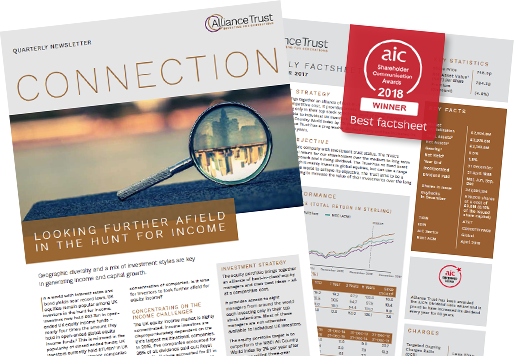Have you ever been contacted by a bank or building society with the news that you have an account you had forgotten all about? Or maybe you’ve been the instigator of the hunt, trying to track down a lost pension, insurance policy or shares?
If so, you’re by no means alone. Recent research from Gretel, an online hub being set up to help consumers reconnect with their lost finances, indicates that one in four adults in the UK believes they have at least one lost or dormant cash account, amounting to an estimated 10 million inactive accounts worth £4.5 billion.1
OVER £15 BILLION UNCLAIMED ASSETS IN THE UK
Add in other mislaid financial assets and the numbers rise dramatically. There’s no central record, but Gretel puts the total number of individuals affected at almost 20million and the value of unclaimed assets – including bank accounts, pensions, investments, life insurance and child trust funds – at more than £50 billion, including £37 million in pensions alone. Experian is more conservative, quoting £15-20 billion.2
Certainly, it is all too easy to lose contact with a provider and simply slip off its radar. Many dormant accounts belong to elderly or infirm people who struggle to keep on top of their affairs, or move to a care home and in due course die, often without being able to put their finances in good order. Disconnection can easily happen to younger, healthy people too, particularly as a result of key life changes such as moving house, getting married or switching jobs, or if they make an investment without informing their partner.
Assets can also go adrift if a company changes its name, is bought out or wound up. Such events have happened many times in the world of financial services over the past 20 or 30 years. The issue of lost assets has been recognised by financial services companies for quite a while. Since 2008 there has been a dormant assets scheme in place for banks and building societies, allowing them to transfer dormant assets whose owners cannot be traced to a separate fund that supports various good social causes.3 At present, 33 financial institutions are signed up;4 around £100million has been successfully returned to the owners of 110,000 accounts, while unclaimed savings worth almost £750million have gone to charitable schemes.5
The government has recently confirmed the extension of that scheme to other types of financial asset – including investments and shares such as those owned by Alliance Trust shareholders – though there is no indication as to when it could take effect.6
WHEN IS AN ASSET CONSIDERED 'DORMANT'?
One big question this throws up for consumers, is just how ‘dormant’ an asset needs to be before a financial services provider should take the initiative and try to hunt down the owner. As things stand, there’s no universally accepted definition of dormancy, but the government’s consultation proposes that a dormant share should be seen as one where there have been no transactions or contact from the shareholder for at least 12 years, and during that time the provider has made ‘reasonable efforts’ without success to reunite the asset with its owner, and at least three dividends have gone unclaimed or unpaid.7
Importantly, though, before an asset can be considered dormant, the institution has to make its best efforts to try to bring it toits owner’s attention. Some, Alliance Trust included, operate a tracing programme through which they make regular or ado attempts to track down ‘gone-away' account-holders or shareholders.
These programmes are particularly important – from the perspective of good housekeeping as much as best practice– after a corporate action such as a merger or acquisition, points out share administrator EQ (formerly Equiniti). “By not running a tracing programme after accorporate event, a company may incur added complexity and cost in maintaining their register,” it notes.8
More generally, so-called asset reunification programmes are considered “not only best practice but also good corporate governance”.
ALLIANCE TRUST’S TRACING COMMITMENT
At Alliance Trust, a recent overhaul of the company articles (its rules and regulations) provided the catalyst to undertake such an exercise. Having updated the Company’s definition of what counts as dormancy, the share registrars identified 90 Alliance Trust ‘gone-away’ shareholders to betrayed. Between them, they owned about £1 million in shares and had uncashed dividends totalling over £200,000; the largest holding comprised 10,000 shares, and the longest-dormant account went back to 1998.
In fact, this was not the first such effort made by Alliance Trust – a previous search had thrown up 291 names, including some of the outstanding 90, and an external company had had some success, repatriating 170 shareholders with their shares and dividends, with another 51 identified but still to finalise their claims.
But this time around, rather than simply repeating the process, Alliance Trust’s commercial and corporate governance manager, Ian Anderson, decided to do some more in-depth sleuth work of his own, followed by a personal approach from the Company. Starting with the largest shareholdings, he made online searches of publicly available resources such as death registrations, which in some cases led to wills available in the probate registry, and in turn to the names of executors and solicitors involved in the winding-up of the estate.
Some searches proved pretty straightforward. “LinkedIn was a good way of making contact with people by telephone, or by email where an email address could be found. This also allowed the individuals I contacted, the information that they needed to check that my contact was bona fide and not some form of phishing scam,” Anderson says.
“For example, one shareholder had a very distinctive name which came up quickly from a simple Google search followed up by a LinkedIn contact, so that took maybe half an hour at most.” This gave the shareholder a windfall of nearly £2,000 inpats dividends.
But on other occasions he found himself having to think very laterally. Tracking down the identity of one long-dead shareholder involved working out where she had lived many years ago and talking to the current owners, who remembered her as a previous occupier. Another, which has not been successful to date, involved him contacting several firms of solicitors to try to find someone with knowledge of the deceased. “That has probably taken a number of hours,” he reckons.
Anderson makes the point that given the considerable value of the unclaimed shares and dividends, it’s important that the Company takes all practicable steps to find the owners. “We will now use a professional database search tool on those shareholders that we have not managed to contact, and follow up with letters or telephone calls where we think we have found someone,” he adds.
Clare Dobie, Director of Alliance Trust
A STARTING POINT
Of course, it’s great news that companies take the issue of dormant assets seriously and make concerted attempts to trace the owners. But what can you do if you think you’ve lost an account, shares, or a pension along the way? The good news is that there are websites that may be able to help you trace your mislaid assets.
A sensible place to start, if you’re looking for a pension, insurance policy or child trust fund, is with the guidance on the Association of British Insurers (ABI) website.9 More generally, you could contact the Unclaimed Assets Register onuar.co.uk, which is run by Experian and is a paid-for service.
Gretel’s unclaimed assets search service is free to consumers, fully digitalised and covers all types of financial holding. It has not launched at time of writing, but you can register your interest at gretel.co.uk
Even if you haven’t lost any accounts, there are certain precautionary measures you can take to keep your affairs in order. They sound obvious, but the figures for unclaimed assets demonstrate that all too often people overlook these simple steps.
- If you move house, make sure you provide your new address to every financial services provider you have dealings with – including the ones you rarely hear from or contact.
- If you change your bank account, check bank statements over the previous year to ensure you have updated every organisation that pays into your account or that you make payments to.
- Maintain a paper or online record of your investments and insurance policies, including account numbers. If company names change or you switch to a new provider, update the topsheet.
- Even if you already have a workplace pension into which you’re making contributions, consider setting up a SIPP (Self-Invested Personal Pension) account where you can consolidate any pensions from previous jobs. The government’s free Pension Tracing Service10 may be able to help you find any you have lost the details for, but this is an area where it really is important to hang on to the paperwork.
- One way of managing your affairs, which is also designed to make life straightforward for the executors of your estate after you die, is to make use of the List pals app. It’s free to download from listpals.com
THE SHARES THAT GOT AWAY
Julia’s father was being cared for in a nursing home when he died back in2002, leaving her to sort out his estate. His small portfolio of shares was sold after his death – so the contact from Ian Anderson to say that a further tranche of Alliance Trust shares had been overlooked, came as a real bolt from the blue.
The windfall amounts to 2,450 shares plus more than £4,000 in unclaimed dividends. “I guess I’m currently in a state of feeling it’s a lovely surprise to have, but I need to work through everything before I allow myself to fully believe it,” says Julia.
Ian’s work involved obtaining details of Julia’s father’s will and probate and locating his beneficiaries – one of whom, Julia, he identified as being in practice as an architect. He was able to track her down through the Royal Institute of British Architects (RIBA) and the internet to give her the good news.
“My father’s affairs were well filed and documented, so I can only surmise that either the solicitor who sorted out probate missed this, or there was another, unknown reason why the shares were mislaid,” Julia adds.
“I’ve had to locate various pieces of paperwork and send original copies off, and currently have some more forms to fill in, so I am not in a position to sell yet. And I have to contact HMRC to understand the possible tax implications as well. But if all goes well, the beneficiaries may be able to look forward to a decent holiday with the proceeds post-Covid!
SLEUTH WORK VIA SOCIAL MEDIA
When Henry’s wife Naomi died 22 years ago, he had no idea she owned shares in Alliance Trust: they had been a gift from her father a few years previously. “My father-in-law was administering them after her death, and everything was a little chaotic at the time,” recalls Henry, who works in IT.
In this case, detective work by Ian Anderson to unite the lost shares with their rightful owners involved accessing copy of Naomi’s will and the probate document, which revealed her husband’s name. Ian was able to identify Henry through Companies House; he used the LinkedIn social media app to get in touch and break the good news that 8,700 shares in his wife’s name were waiting for him.
Ian has been guiding Henry through the bureaucracy involved in selling the shares and getting access to £16,500 in dividends. “Dividends more than 12 years old are statute-barred from claims for repayment, but I had a word with the Alliance Trust chairman and he approved their payment in this case,” says Ian.
Once the whole process is done and dusted, Henry says, “The money will go tour children who are now young adults, and will help towards the deposits for their first flats in due course.
TRANSATLANTIC ALLIANCE
“Paul Newsam, a web developer working for Accenture in the US, had simply forgotten about a tranche of 1,750 Alliance Trust shares purchased by his father in 1998 and given to him in 2004. Paul was born in the US, but his father had grown up in the UK and had various British investments as a consequence of that connection.
“My father managed a number of different accounts for my benefit, and although he passed along the necessary details at some point, I lost track of them somewhere along the way. For many years financial responsibility was not my strong suit! I may have sniffed out the trail at some point, but Ian Anderson’s message was certainly a welcome one,” he says.
The job of tracking down the shareholder in this case was complicated by the fact that he had moved to a new house within the US several times over the years. Ian used the services of a US-based search agency to identify Paul, and then made contact through Paul’s own website.
Paul has now been reunited with the shares, plus more than £2,500 in dividends. It was a simple process to create an online account and update the necessary details following Ian’s instructions, he says. “I don’t have any immediate plans for the shares, but the dividends are going right back to be reinvested,” he adds.
READ MORE INVESTMENT INSIGHT






